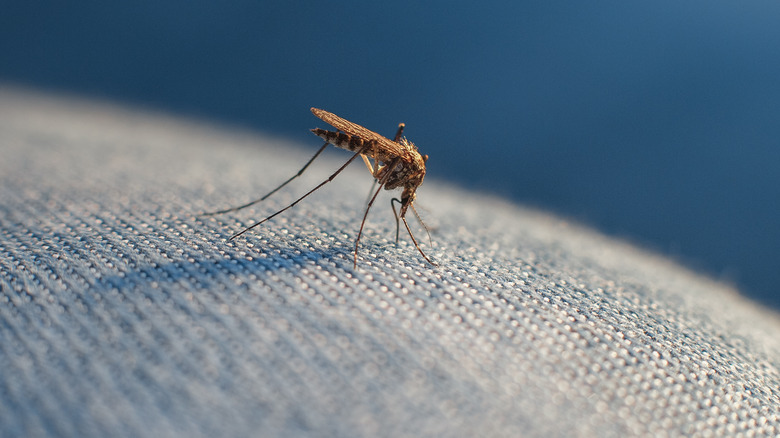Can A Mosquito Bite Through Your Clothing?
If you venture outdoors in shorts and a tee-shirt on a warm summer night, don't be surprised if you return home with a few fresh bug bites — especially if you've decided to forgo the bug spray.
Any one of us is susceptible to mosquito bites, yet some people seem to be more appealing to these pests than others. Experts at WebMD explain that the exhalation of carbon dioxide is one factor that plays into this. Therefore, exerting yourself with vigorous exercise while outside will cause you to take more breaths and potentially attract more mosquitoes. The same is true for pregnant women, who also tend to release more carbon dioxide when breathing. Motion, heat, as well as higher levels of uric acid, cholesterol, or steroids residing on one's skin can also pique the interest of mosquitoes.
We've all been told that one of the best ways to protect ourselves from nasty insect bites is to wear protective clothing that covers our skin. As it turns out, however, certain types of materials are no match for a hungry mosquito.
These are the fabrics mosquitos can bite through
The thicker the fabric, the less likely a female mosquito's proboscis, or mouth parts, will be able to pierce through the material and down to the skin. For example, denim, velvet, nylon ripstop, and tight-knit wool are much harder for a mosquito to penetrate (via Healthline). Oppositely, gauze, voile, or spandex serve as poor barriers against mosquito bites. Spandex, in particular, sits snugly up against our skin, offering easy access to the skin's surface. Luckily, there is a middle ground. Polyester, medium-weight cottons, and silk cotton blends provide moderate protection against bloodthirsty mosquitoes.
Research has shown that clothing infused with insecticide, specifically permethrin, can help keep mosquitoes at bay. While previous studies have found these garments to be effective in the short-term, researchers from a 2015 study published in The American Journal of Tropical Medicine and Hygiene found that long-lasting permethrin-impregnated uniforms offered outdoor laborers significant protection against mosquito bites on a long-term basis for one year. With growing concerns about pesticide exposure amongst the public, however, researchers have been working to develop alternate clothing options that are void of insecticides, yet still provide adequate protection against mosquito bites. The added challenge is ensuring that these garments are still comfortable for the wearer.
What about insecticide-free clothing?
Thanks to researchers from a 2021 study published in the scientific journal Insects, insecticide-free clothing options may be a possibility. Rather than focusing on chemical treatments, the study team experimented with fabric thickness and pore diameter. This included pore sizes ranging from those that were small enough to prevent the tip of the mosquito's labrum (piercing mouthpart) from fitting through, as well as larger pore sizes that could accommodate the labrum and the head of the mosquito but not the antennae. While smaller pores would reduce the amount of human odor being released to attract mosquitoes, this also means that the clothing would be less breathable for the wearer.
In the end, the study team developed insecticide-free fabrics that fared better than permethrin-treated fabrics in terms of bite-resistance. The sample garments also proved more comfortable compared to similar garments on the market and provided complete mosquito-bite protection. While more research is needed, these findings illustrate the potential for insecticide-free clothing pieces that can effectively reduce our risk of mosquito bites. "Everyday clothing you wear in the summer is not bite-resistant to mosquitoes," said Michael Roe, William Neal Reynolds Distinguished Professor of Entomology at NC State who worked on the study, in a NC State University press release. "Our work has shown that it doesn't have to be that way. Clothes that you wear every day can be made bite-resistant."



